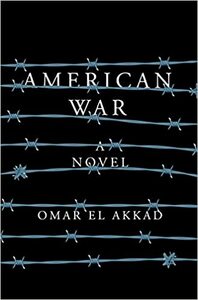You need to sign in or sign up before continuing.
Take a photo of a barcode or cover
Read for MERA book club. A scary read. So many possibilities for our future and I hated it. Not the writing though - that was excellent.
I've often said that dystopian novels have to be on the gentle side for me to enjoy, and perhaps this one is just a bit on the edge of that line. However, I really liked the world built and found there to be much to ponder. Even though we do not often share, it is one that I tossed into Dh's pile.
Have you ever read a book that you absolutely KNOW is amazing, but that just isn't the right book for you at that moment? This is why I'm giving this book four stars instead of five - I can tell you that this is an amazing - incredibly amazing and beautiful book. But I did not have the appropriate amount of energy to really dig into this, which makes me sad. Fast forward about 50 years into the future, and America is in the middle of its second civil war - fought between the north and south again, but this time over environmental protections and the limitation of fossil fuels. In the middle of this, one young woman suffers dramatically at the hands of the north, and we learn how a terrorist is made. This is well worth a read.
dark
sad
medium-paced
Plot or Character Driven:
Character
Strong character development:
Yes
Loveable characters:
Complicated
Diverse cast of characters:
Yes
Flaws of characters a main focus:
Yes
Graphic: Confinement, Violence, War
I picked this off the shelves of the library, having previously heard of it and decided I wasn't interested. The novel definitely pulled me through it, and I enjoyed reading it, but it never quite connected me to it's characters. It felt like the history book it was half-framed as, even though it wasn't explicitly intended to be. The worldbuilding felt stronger than the plot, except for the fact that somehow the fact that the protagonist was a black gay woman came up a total of three times, none with actual consequences, in a book about a separatist American south only fifty-seventy years in the future- a confusing oversight that was never addressed and felt like a huge gap in the world building (the most significant act of bigotry is an anti-Catholic sentiment nonviolently expressed, somehow). But other than that, it was immersive and as bold a look at the environmental future as I've seen, not that I'm well read in the area.
Imagine a second Civil War, complete with drones, refugee camps, and biological weapons. Now put yourself in the mind of a young girl growing up in a camp after her family's home is destroyed. An engaging tale of the consequences of war beyond the deaths and physical destruction.
The writing of this was beautiful. It's one of those stories that sounds good out loud. The story here, America - in the midst of it's second civil war - north against south - fighting over the ban of fossil fuels in an America that has lost it's coasts to the sea - was all too easy to imagine. The story follows a family affected by war - a child growing up a refugee in her own country. Its a striking look into a not to unimaginable future America.
I finished this on my flight home and had to hold back tears while my heart raced for last 100 pages. It was also the only book that I've ever immediately gone back and re-read the prologue when I finished the book and was still compelled.
I finished this on my flight home and had to hold back tears while my heart raced for last 100 pages. It was also the only book that I've ever immediately gone back and re-read the prologue when I finished the book and was still compelled.
Listened to this in almost one sitting on the train from Portland to Spokane and emerged from the train unsure of who I was, how I got there, or if America was actually at war over fossil use.
The book is as hard and dark as an American Civil war could be, and, as in war, the violence feels unhinged and unconnected to any belief system outside of gaining power, maintaining power or simple revenge. Violence drives the plot, pushing the characters through displacement, loss, rage, and grief, doing so in a way that feels conceivable for this country in the near future.
An aside, but the main character is a black latina woman, though her race is barely brought up. This lack of acknowledgment seems to leave a hole in what it means to an American of colors, and I'm curious what WoC in the south thought of that approach or what would/could be done differently.
I'm not the first to say that between the rich descriptions and well-realized characters the dialogue was one of the weaker points, but listening to Dion Graham's rendition fixed almost everything about that. Plenty of places that could have felt awkward or strange to read in letter were smoothed over and made into an enriching part of the novel.
Lastly, in flipping around through other reviews I'm surprised at the lack of mention of El Akkad's previous work as a war correspondent and Guantanamo journalist, as it is so incredibly evident in the rendering of events. Even going into it knowing that background I was not mentally fucking prepared for the physical torture scenes pulled directly from the techniques used at Gitmo. Shit was real and felt real because he'd seen it himself or heard of it directly from those who had.
Full disclosure: I know El Akkad as an acquaintance and enjoy name dropping him at parties, which I've started to realize doesn't really do much but makes me feel cool. So thanks to Omar for this terrifying and great book and giving me something to babble about at strangers.
The book is as hard and dark as an American Civil war could be, and, as in war, the violence feels unhinged and unconnected to any belief system outside of gaining power, maintaining power or simple revenge. Violence drives the plot, pushing the characters through displacement, loss, rage, and grief, doing so in a way that feels conceivable for this country in the near future.
An aside, but the main character is a black latina woman, though her race is barely brought up. This lack of acknowledgment seems to leave a hole in what it means to an American of colors, and I'm curious what WoC in the south thought of that approach or what would/could be done differently.
I'm not the first to say that between the rich descriptions and well-realized characters the dialogue was one of the weaker points, but listening to Dion Graham's rendition fixed almost everything about that. Plenty of places that could have felt awkward or strange to read in letter were smoothed over and made into an enriching part of the novel.
Lastly, in flipping around through other reviews I'm surprised at the lack of mention of El Akkad's previous work as a war correspondent and Guantanamo journalist, as it is so incredibly evident in the rendering of events. Even going into it knowing that background I was not mentally fucking prepared for the physical torture scenes pulled directly from the techniques used at Gitmo. Shit was real and felt real because he'd seen it himself or heard of it directly from those who had.
Full disclosure: I know El Akkad as an acquaintance and enjoy name dropping him at parties, which I've started to realize doesn't really do much but makes me feel cool. So thanks to Omar for this terrifying and great book and giving me something to babble about at strangers.
adventurous
dark
mysterious
tense
fast-paced
Plot or Character Driven:
A mix
Strong character development:
Yes
Loveable characters:
No
Diverse cast of characters:
No
Flaws of characters a main focus:
Yes





